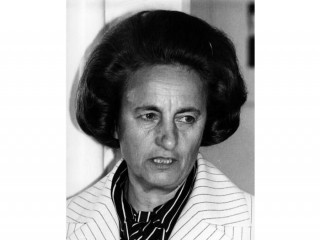
Elena Ceausescu biography
Date of birth : 1916-01-06
Date of death : 1989-12-25
Birthplace : Petreşti commune, Damboviţa County, Romania
Nationality : Romanian
Category : Politics
Last modified : 2011-08-30
Credited as : Deputy prime minister, wife of Nicolae Ceausescu, assasinated
0 votes so far
During the Communist period, much of this information was concealed. Official history texts mythologised Elena and Nicolae, transforming them into a national success story. Much of Elena's appeal as a female idol was fiction, and perhaps the post-89 revelation of the extensive fantasy surrounding her also damaged the potential for women in Romanian politics.
Elena Ceausescu's failures in her school days and her position as wife of the leader resulted in an inferiority complex. The myth of Elena Ceausescu involved the falsification of achievements to establish a facade of an intelligent, strong and powerful leading lady.
Once she had arrived in Bucharest she was employed as a hired hand in a somewhat shady medicine factory. Later she was to become chairman of ICECHIM, the main chemistry research laboratory in Romania. There she masqueraded as a world-renowned chemist and scientist. Using her influence rather than her intellect, she was awarded a doctorate in chemistry (this from the woman who had left school early to harvest the fields). She knew little about the sciences but yearned for recognition and acceptance.
Elena's desire for international recognition far outweighed that of her husband. Much of their business on official visits abroad concerned the attribution of honorary degrees in recognition of her scientific work. In reality, this work amounted to little.
Mircea Codreanu, a diplomat at the Romanian Embassy in Washington has summed up this side of her character rather succinctly: 'Being an ignorant, uneducated, primitive kind of woman, she really thought that if she had some titles after her name, it would change her image'. (Behr, E, Kiss the Hand you Cannot Bite, Penguin, 1991, p.160)
Determination was perhaps the one positive aspect of Elena's character. This might even be considered a good example for Romanian women today had Elena's determination been to do more than simply appear more significant and important than she actually was (though admittedly this is a trait of most politicians). In any case, her determination - combined with a strong dose of Ceausescu-era nepotism - did, indeed, take her far.
In 1968, Elena Ceausescu became a member of the Romanian Communist Party's Bucharest Municipal Committee. By 1972, she had become a member of the Central Committee, and in 1973, she reached the Executive Committee. In 1979, she became an ex officio member of the cabinet through her chairmanship of the National Council of Science and Technology. By 1980, she was deputy premier, second in command to Nicolae himself.
Ceauşescu was the object of a personality cult as intense as that of her husband, which exalted her as the "Mother of the Nation." By all accounts, her vanity and desire for honours exceeded that of her husband. As with her husband, Romanian Television was under strict orders to take great care portraying her on screen. For instance, she was never supposed to be shown in profile because of her homely appearance (though she'd been very attractive in her youth) and large nose. Publicly, Ceauşescu said that it was an honor to be referred to as "comrade", but Romanian expatriates in the United States frequently referred to her as "Madame Ceauşescu" with great disdain.
Ceauşescu fled with her husband on December 22, 1989, after the events in Timişoara led to the Romanian Revolution, but she and her husband were captured in the town of Targoviste. At the show trial that took place, she answered only a few questions since her husband took a protective role, asked her to calm down and shook his head each time her mouth opened to reply in anger. On the afternoon of December 25, 1989, (Christmas Day) in Târgovişte they were turned over to a firing squad and executed. She was almost 74 years old.
Perhaps not surprisingly with Elena Ceausescu as the only possible role model, few women enter the Romanian political arena today. With most Romanians wishing to move away from Communism and nepotism towards a more democratic Romania, her figure is only backward-looking. Elena Ceausescu merely conjures up an image of extravagance in the face of a backward and suffering society: hardly the perfect example for an aspiring female politician today.
To call Elena Ceausescu a politician, however, would be misleading. Just because she held a position of considerable power does not imply any political skill on her part. She served as a national example of what women could achieve and how they should achieve it. It was not her success within the Romanian Communist party that raised her to such a high level of influence; it was the success of her husband.
The legacy of Elena Ceausescu has been a society unprepared and unwilling to see women enter positions of power. The traditionally patriarchal structure of society itself only re-enforces this. The women who have held positions of influence are few and obscure in the face of Elena Ceausescu's infamy.
Sadly for Romanian women wishing to enter politics today, no other, more positive role model has come along in the past ten years.
















